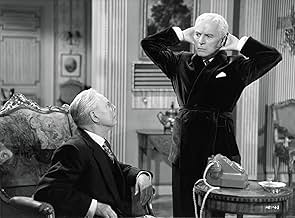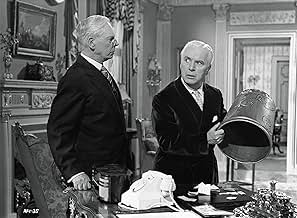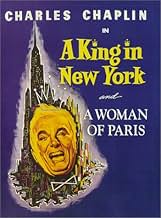CALIFICACIÓN DE IMDb
7.0/10
9.5 k
TU CALIFICACIÓN
Un monarca europeo recientemente depuesto busca refugio en la ciudad de Nueva York, donde se convierte accidentalmente en una celebridad televisiva y luego es acusado erróneamente de ser com... Leer todoUn monarca europeo recientemente depuesto busca refugio en la ciudad de Nueva York, donde se convierte accidentalmente en una celebridad televisiva y luego es acusado erróneamente de ser comunista.Un monarca europeo recientemente depuesto busca refugio en la ciudad de Nueva York, donde se convierte accidentalmente en una celebridad televisiva y luego es acusado erróneamente de ser comunista.
- Premios
- 1 premio ganado y 1 nominación en total
- Dirección
- Guionista
- Todo el elenco y el equipo
- Producción, taquilla y más en IMDbPro
Opiniones destacadas
Someone once described "A King in New York" as the worst film ever made by a major artist. I can think of many worse examples and while this late Chaplin picture may lack the genius of his earlier work, (it was his penultimate film; he made it several years after "Limelight" and before "A Countess from Hong Kong"), it is an often very funny satire on what Chaplin perceived as 'the modern age'. Driven out of America by McCarthyism, Chaplin constructed his New York in a British studio and typical of its writer, director, star and composer it makes no apology for its attack on right-wing politics, in particular the HUAC, as well as television, Cinemascope and plastic surgery. It's also less sentimental than it might have been, (always Chaplin's biggest fault), but the plot involving a child played by Chaplin's own son Michael, does the film no favours. On the other hand, Chaplin himself is superb and Dawn Adams is surprisingly good as a television star. No masterpiece, then but not quite the disaster some people have said of it either.
Charles Chaplin had a love-hate relationship with the United States of America. On the one hand, it was in Hollywood that the British-born comedian and filmmaker built a successful life and career, immortalising himself as one of the most beloved directors and stars in the history of cinema. On the other hand, Chaplin's political attitudes during the 1940s that America should form an alliance with the Soviet Union in order to fight Adolf Hitler's fascist regime led to his being labelled a Communist or Communist sympathiser. In 1952, Chaplin returned to his home-town of London for the premiere of the brilliant 'Limelight (1952),' where he was greeted with great enthusiasm, though with his arrival came the news that the American government had rescinded his re-entry visa into the United States. Over the next few years, the aging filmmaker toyed with numerous ideas for his next film including a possible resurrection of the Little Tramp before settling upon 'A King in New York,' whose screenplay took about two years to complete.
'A King in New York (1957)' tells the story of King Shahdov (Chaplin), a dethroned monarch who seeks refuge in the United States, his entire wealth cunningly stolen from him. The film starts off as an amiable slapstick comedy, which is basically what I had been expecting, before branching off into darker territory, become a scathing satiric assault on almost everything that America stands for. When he first arrives in the country, King Shahdov revels in the peace and liberty of this grand nation, exclaiming to his dedicated ambassador, Jaume (Oliver Johnston): "if you knew what it means to breathe this free air. This wonderful, wonderful America. Its youth, its genius, its vitality!" However, through his relationship with a brilliant young boy, Rupert Macabee (Chaplin's own son, Michael), whose parents happen to be members of the Communist party, Shahdov becomes embroiled in the period's rampant McCarthyist witch-hunts, revealing the devastating truth that perhaps America's notions of freedom have become a mere illusion.
Despite Chaplin's insistence that "my picture isn't political," it most undoubtedly is, with the director just as he did in the final scenes of 'Monsieur Verdoux (1947)' evidently expressing his distaste for what society has become. It's easy to dismiss 'A King in New York' as pro-socialist propaganda, but to do so would be completely missing the very idea behind the film. Personally, I'm unsure of Chaplin's official stance on Communism itself, but the filmmaker certainly reviled the manner in which the United States government approached the issue, citing it as an immoral invasion of privacy and liberty. Chaplin described himself as having no political convictions: "I am an individualist, and I believe in liberty." Perhaps referring to the Hollywood blacklist, he once said: "These are days of turmoil and strife and bitterness. This is not the day of great artists; this is the day of politics."
'A King in New York' was filmed at Shepparton Studios in London, and the film does a very successful job of imitating the hustle-and-bustle of the Big Apple. As well as expressing his stance on McCarthyism, Chaplin also aims a few effective jabs at commercialisation and popular culture, prophetically predicting the prominence of commercial chain-stores, cosmetic surgery and reality television {when King Shahdov is unwittingly coaxed into attending a televised dinner party, continually baffled as to why his lady interest (Dawn Addams) keeps unexpectedly launching into advertisements}. Though my review has stressed the political implications of the film, 'A King in New York' also works pretty well as a light comedy, and I almost died laughing when Chaplin walked into the House Committee on Un-American Activities with a fire-hose attached to his finger. Michael Chaplin's impassioned tirades on the degradation of America were also a riot to watch, even if the young actor can occasionally be spotted mouthing his father's lines. Owing to its somewhat disagreeable stance towards the United States, Chaplin was unable to find any willing American distributors, and so 'A King in New York' remained unseen there until the 1970s. "Freedom of speech," indeed.
'A King in New York (1957)' tells the story of King Shahdov (Chaplin), a dethroned monarch who seeks refuge in the United States, his entire wealth cunningly stolen from him. The film starts off as an amiable slapstick comedy, which is basically what I had been expecting, before branching off into darker territory, become a scathing satiric assault on almost everything that America stands for. When he first arrives in the country, King Shahdov revels in the peace and liberty of this grand nation, exclaiming to his dedicated ambassador, Jaume (Oliver Johnston): "if you knew what it means to breathe this free air. This wonderful, wonderful America. Its youth, its genius, its vitality!" However, through his relationship with a brilliant young boy, Rupert Macabee (Chaplin's own son, Michael), whose parents happen to be members of the Communist party, Shahdov becomes embroiled in the period's rampant McCarthyist witch-hunts, revealing the devastating truth that perhaps America's notions of freedom have become a mere illusion.
Despite Chaplin's insistence that "my picture isn't political," it most undoubtedly is, with the director just as he did in the final scenes of 'Monsieur Verdoux (1947)' evidently expressing his distaste for what society has become. It's easy to dismiss 'A King in New York' as pro-socialist propaganda, but to do so would be completely missing the very idea behind the film. Personally, I'm unsure of Chaplin's official stance on Communism itself, but the filmmaker certainly reviled the manner in which the United States government approached the issue, citing it as an immoral invasion of privacy and liberty. Chaplin described himself as having no political convictions: "I am an individualist, and I believe in liberty." Perhaps referring to the Hollywood blacklist, he once said: "These are days of turmoil and strife and bitterness. This is not the day of great artists; this is the day of politics."
'A King in New York' was filmed at Shepparton Studios in London, and the film does a very successful job of imitating the hustle-and-bustle of the Big Apple. As well as expressing his stance on McCarthyism, Chaplin also aims a few effective jabs at commercialisation and popular culture, prophetically predicting the prominence of commercial chain-stores, cosmetic surgery and reality television {when King Shahdov is unwittingly coaxed into attending a televised dinner party, continually baffled as to why his lady interest (Dawn Addams) keeps unexpectedly launching into advertisements}. Though my review has stressed the political implications of the film, 'A King in New York' also works pretty well as a light comedy, and I almost died laughing when Chaplin walked into the House Committee on Un-American Activities with a fire-hose attached to his finger. Michael Chaplin's impassioned tirades on the degradation of America were also a riot to watch, even if the young actor can occasionally be spotted mouthing his father's lines. Owing to its somewhat disagreeable stance towards the United States, Chaplin was unable to find any willing American distributors, and so 'A King in New York' remained unseen there until the 1970s. "Freedom of speech," indeed.
Now, I've yet to see A COUNTESS FROM HONG KONG, but out of Chaplin's full-length talkies, I didn't find A KING IN NEW YORK terrible by any stretch. In fact-- and I might lose cinephile points for admitting it-- I'd take this over the more prestigious LIMELIGHT any day! It's less self-indulgent and self-loving, and the satire of American media culture still mostly works.
Why does this get so much hate? Maybe it's the film's roughness. It's clearly set-bound and those sets do look cheap most of the time. But money can't buy inspiration, and I think this movie has more than enough inspiration to make up for its lesser production values. Many of the vignettes are delightful and the bittersweet edges (the subplot with Shadov's estranged queen, the character arc of the philosophical young boy) lend this film a great deal of memorability.
Why does this get so much hate? Maybe it's the film's roughness. It's clearly set-bound and those sets do look cheap most of the time. But money can't buy inspiration, and I think this movie has more than enough inspiration to make up for its lesser production values. Many of the vignettes are delightful and the bittersweet edges (the subplot with Shadov's estranged queen, the character arc of the philosophical young boy) lend this film a great deal of memorability.
... while he himself was basically exiled in a strange land. 1957's "A King in New York" shows Chaplin at the end of his film career. In fact, it is the last film in which Chaplin himself stars. Refused permission to reenter the U.S. in 1952 due to the idea that he held anti-American beliefs, he actually made this film about a deposed European king in New York in England. The film suffers from production values that are not as high as they were in Chaplin's earlier films, and if you have the version Warner Brothers put out in 2004, the commentary points out that Chaplin had much trouble making this film mainly because he was not dealing with familiar personnel in his own studio as he had in his earlier efforts. The film's political statements are heavy-handed, but there are still some good comic turns by Chaplin and his viewpoints and comic bits on America and rampant commercialism and consumerism still hold up today. In fact, they are probably much more relevant today than they were when this movie was first made.
If you are curious about Chaplin's work you need to eventually view this film, just don't start your journey here. If you are just starting out, I recommend you view Chaplin's Mutual Comedies. These are 12 two-reel comedies Chaplin made in 1916 and 1917 and show his comic technique evolve from the pants-kicking fests of his Essanay and Keystone films into the sophisticated technique he had from the end of the series onward. Also, the Mutual period was named by Chaplin himself as the era in both his personal and professional life in which he was the happiest.
If you are curious about Chaplin's work you need to eventually view this film, just don't start your journey here. If you are just starting out, I recommend you view Chaplin's Mutual Comedies. These are 12 two-reel comedies Chaplin made in 1916 and 1917 and show his comic technique evolve from the pants-kicking fests of his Essanay and Keystone films into the sophisticated technique he had from the end of the series onward. Also, the Mutual period was named by Chaplin himself as the era in both his personal and professional life in which he was the happiest.
A great film that was neglected by the good old US of A when it was released in the late 50's. It was brandished as being to critical of the political atmosphere of the United States at the time. It's funny that Chaplin could manage to offend both Adolf Hitler (The Great Dictator) and the fascist-like/inspired 'anti-communist' movement of the 50's/early 60's U.S.A. There is actually a common link in those two movements (Naziism and the 50-60's 'anti-communist movement in the USA but I won't get into that here). Anyway, it is sad that this film is overlooked as it is one of Chaplin's best and should be looked as one in a career overview of this great filmmaker. Besides him, in the film there really is not any awe-inspiring actor/actress but Chaplin brings out the best in everyone and elevates them from eternal anonymity to something of recognition. His son Michael Chaplin for example is used quite wonderfully in this film. I later bought Michael Chaplin's late teenage memoir 'I Couldn't Smoke the Grass on my Father's Lawn' based on seeing him in this film and him impressing me so. It's too bad he could not develop more as an actor or recording star (he released a single in Britain in the mid-60's). I heartily recommend this film. See it and be open minded. Take a look at the way your country was run 50 years ago and ask yourself have things really changed this day in age when the 'communists' have know been replaced by the 'terrorists'.
¿Sabías que…?
- TriviaThe first film that Sir Charles Chaplin made in the UK after his exile from America, and his last leading role in a movie.
- ErroresDuring his diatribe, Rupert claims that the Roman Empire fell with the assassination of Caesar. Caesar's assassination occurred 17 years before the Roman Empire was established.
- Citas
[after being told that the political turmoil in America is just a "passing phase."]
King Shahdov: Quite so. In the meantime, I'll sit it out in Europe.
- Versiones alternativasOriginal British prints run about five minutes longer than the version that was released in America in 1976. It is this American version that is available on video, but the British cut is available on disc.
- ConexionesEdited into Histoire(s) du cinéma: Fatale beauté (1994)
Selecciones populares
Inicia sesión para calificar y agrega a la lista de videos para obtener recomendaciones personalizadas
- How long is A King in New York?Con tecnología de Alexa
Detalles
- Fecha de lanzamiento
- Países de origen
- Sitios oficiales
- Idioma
- También se conoce como
- A King in New York
- Locaciones de filmación
- Productora
- Ver más créditos de la compañía en IMDbPro
Taquilla
- Total a nivel mundial
- USD 910
- Tiempo de ejecución
- 1h 50min(110 min)
- Color
Contribuir a esta página
Sugiere una edición o agrega el contenido que falta























